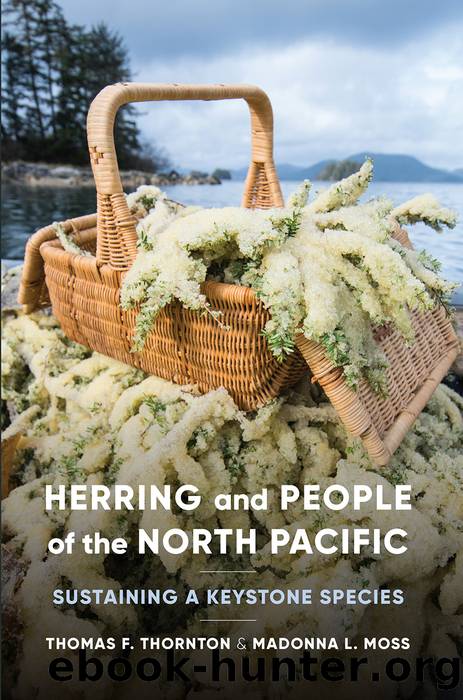Herring and People of the North Pacific by Thomas F. Thornton;Madonna L. Moss;

Author:Thomas F. Thornton;Madonna L. Moss;
Language: eng
Format: epub
Publisher: Lightning Source Inc. (Tier 3)
Published: 2020-01-15T00:00:00+00:00
Related to territorial restrictions and individual acts to limit demand were sanctions taken against outsiders who simply took too much. In a small, homogenous community, conservation by prescription or taboo often functioned well enough without additional sanctions. But in heterogeneous or rapidly changing communities, such internal sanctions often lost their force and had to be supplemented with more potent intervention. Natives often appealed to territorial or state law enforcement for help in such cases. In a memoir of his years teaching in Klawock, Oliver Salisbury (1962, 154â56) recalled the following incident from the 1920s:
A boat I was told was from Prince Rupert [BC] and not supposed to be in American waters, loaded and overloaded till its deck was almost awash before pulling out. [W]e learned... later that it eventually reached port, but a large part of its cargo had either been washed overboard or jettisoned. Another day the âConfidenceâ came in from Ketchikan and from one haul of her purse seine loaded 300 barrels of herring [approximately 300,000 fish, or 130 MT] and in three hours time after her entrance had left the inlet after dumping the surplus haul of her seine which she could not brail out for lack of capacity [see fig. 4.3], to float out on the tide, dead. The herring is a delicate fish and quickly succumbs to the crowding and rough handling in the seines, so when they are dumped the mass will float, white bellies up, on the surface of the water and then begin to sink until the bottom twenty or thirty feet down will gleam white with the dead fishâtons of them. I stood on the dock one day watching them settle to the bottom, when a native beside me said, âBimeby all come upâfloat on top waterâmake smellâmake bad smellâmake much bad smell.â The Natives say the run of fish is small compared with other years and it troubles them greatly to have the power boats from Ketchikan and elsewhere, come into their dooryard and raid the herring flood to the extent of thousands of barrels; and in their greed and recklessness, leave other thousands dead behind them because they hauled more in their nets than they could possibly carry away. Herring are the âstaff of lifeâ for them and the spawn is another source of sustenance. What affects one, affects the other.
The seined herring are taken to Ketchikan where they are frozen in the cold storage plants for bait for the halibut and salmon fishing later in the season. The Indians realize the importance of having bait, but the needless and terrible waste of the seiners, whose only consideration is that of loading as quickly as possible and returning for more, alarms them for the safety of their source of food supply, and they became much wrought up over it. The whites, knowing they were ruthless, were cowardly in their greed and complained to the United States Marshal that they were threatened with violence by the Indians, and asked for protection.
Download
This site does not store any files on its server. We only index and link to content provided by other sites. Please contact the content providers to delete copyright contents if any and email us, we'll remove relevant links or contents immediately.
| Fisheries & Aquaculture | Forests & Forestry |
The Lonely City by Olivia Laing(4567)
Animal Frequency by Melissa Alvarez(4148)
All Creatures Great and Small by James Herriot(3986)
Walking by Henry David Thoreau(3681)
Exit West by Mohsin Hamid(3634)
Origin Story: A Big History of Everything by David Christian(3472)
COSMOS by Carl Sagan(3346)
How to Read Water: Clues and Patterns from Puddles to the Sea (Natural Navigation) by Tristan Gooley(3239)
Hedgerow by John Wright(3106)
How to Do Nothing by Jenny Odell(3101)
The Inner Life of Animals by Peter Wohlleben(3099)
How to Read Nature by Tristan Gooley(3077)
Project Animal Farm: An Accidental Journey into the Secret World of Farming and the Truth About Our Food by Sonia Faruqi(3017)
Origin Story by David Christian(2991)
Water by Ian Miller(2950)
A Forest Journey by John Perlin(2914)
The Plant Messiah by Carlos Magdalena(2745)
A Wilder Time by William E. Glassley(2689)
Forests: A Very Short Introduction by Jaboury Ghazoul(2671)
